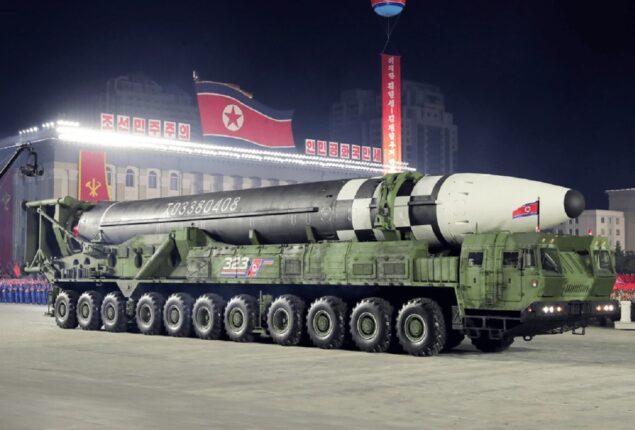North Korea launches two short-ballistic missiles into the sea
North Korea test-fires two short-range ballistic missiles off its east coast, South...

Time to admit that North Korea has a nuclear weapon
It was about as direct as they come in terms of a statement of intent.
North Korea’s leader, Kim Jong Un, declared to the world last month that his country has built nuclear weapons and will never give them up.
He characterized the action as “irreversible,” adding that Pyongyang will keep working on the project “as long as nuclear weapons exist on Earth” and that the weapons represented the “dignity, body, and ultimate authority of the state.”
Even though Kim is not averse to using strong language, his commitment, which he signed into law, should be taken seriously. Remember that this is a tyrant who cannot be removed from office and who typically follows through on his promises.
Remember that North Korea has conducted more than 20 missile launches this year, a record, and that it is rumor red to be preparing for a seventh underground nuclear test. It also claims to be deploying tactical nuclear weapons to field forces, a claim CNN cannot independently verify.
All of this has led a rising number of specialists to wonder if the moment has come to acknowledge North Korea’s nuclear status and call it what it is. By doing so, the hopeful – some might even say foolish – ideas that Pyongyang’s program is in some way incomplete or that it might yet be convinced to give it up voluntarily would be permanently abandoned.
We must simply address North Korea as it is, not how we would like it to be, as Ankit Panda, a Stanton Senior Fellow in the nuclear policy program at the Carnegie Endowment for International Peace, put it.
Few people who closely monitor events in North Korea contest the reality that the country possesses nuclear weapons.
North Korea may have created enough fissile material to construct 45 to 55 nuclear warheads, according to a new Nuclear Notebook article from the Bulletin of the Atomic Scientists. Additionally, recent missile tests indicate it has a variety of ways to deliver such weapons.
For nations like the United States, however, accepting this truth in public carries risk.
Washington’s worries about starting a nuclear weapons race in Asia are among the most convincing arguments against taking this action.
Among the neighbours who would undoubtedly wish to emulate Pyongyang’s status are South Korea, Japan, and Taiwan.
However, some analysts claim that denying North Korea’s nuclear capabilities despite mounting proof to the contrary does little to reassure these nations. Instead, they could become more anxious if they believe that their allies have their heads in the sand.
The foremost academic expert on North Korea, Andrei Lankov, a professor at Kookmin University in Seoul, said, “Let’s admit (it), North Korea is a nuclear armaments state, and North Korea possesses all essential delivery technologies, including quite effective ICBMs.”
Some argue that treating North Korea’s nuclear program similarly to Israel’s would be a better strategy: with implicit acceptance.
Jeffrey Lewis, an adjunct professor at the Middlebury Institute of International Studies in Monterey and the James Martin Center for Nonproliferation Studies, supports such course of action.
“I believe that (US President Joe) Biden needs to make it obvious to himself and the US government that we will not succeed in convincing North Korea to give up its nuclear weapons, and that this means basically embracing North Korea as a nuclear state. You don’t necessarily have to acknowledge it legally, Lewis added.
Israel and India serve as models for the US to follow in dealing with North Korea, he continued.
Israel, commonly thought to have begun its nuclear program in the 1960s, has consistently asserted nuclear ambiguity while refusing to sign on to the nuclear Non-Proliferation Treaty, whereas India long supported nuclear ambiguity before changing that position with its 1998 nuclear test.
“In all of those instances, the US was aware that those nations possessed nuclear weapons, but the agreement was that if you don’t bring it up, don’t make a big deal out of it, and don’t cause political strife, we won’t act. Lewis stated, “I believe that’s the same place we want to get to with North Korea.
Catch all the World News, Breaking News Event and Latest News Updates on The BOL News
Download The BOL News App to get the Daily News Update & Follow us on Google News.